What is a residence card? How to obtain it, what it contains, the obligation to carry it with you, and how to reissue it if you lose it.

Foreign residents who have been in Japan for a medium to long term (more than 3 months) have a "Residence Card", which is a very important identification card that proves your legitimacy to stay in Japan. The Residence Card is a very important identification card that proves that you are legally residing in Japan.
However, not many people understand the details of what a residence card is. The resident card contains important information about your stay in Japan, such as your status of residence and period of stay. In addition, since the resident card is required for identification in many situations, it must be carried with you at all times.
Furthermore, it is important to know what to do if you lose your residence card. In case of emergency, please check how to reissue a new card and what documents are required.
In order to live in Japan with peace of mind, it is essential to have a correct knowledge of the resident card. In this issue, we will explain in detail the basic information on the resident card, how to obtain it, what it contains, the obligation to carry it with you, and how to reissue it if you lose it. Please read to the end.
▼Goandup Picks Click here for recommended articles!
- Required before studying abroad! Goandup Nihongo+, an online Japanese language learning service
- This page introduces services for foreigners who wish to study in Japan or improve their Japanese language skills to learn Japanese online.
- Goandup Salon" community for foreigners living in Japan
- We introduce an online community where foreigners living in Japan can exchange information and interact with each other to support their life in Japan.
- Goandup Study" supports foreigners who want to study in Japan.
- This section introduces study abroad support services that provide comprehensive support to foreigners who wish to study in Japan, from preparation for study abroad to living in Japan.
- Where can I buy a prepaid SIM in Japan? Recommended SIM cards for foreigners are also introduced.
- How to purchase a prepaid SIM and suitable SIM cards for foreigners.
- The Complete Guide to Pocket Wi-Fi in Japan for Foreigners!
- We introduce how to select and recommend pocket Wi-Fi products that can be used conveniently in Japan.
- The Complete Guide to Finding a Job in Japan! Finding a job, changing jobs, and part-time work for foreigners
- This site provides foreigners who want to work in Japan with comprehensive information on how to find a job, recommended job sites, and other information necessary to find a job.
What is a residence card?
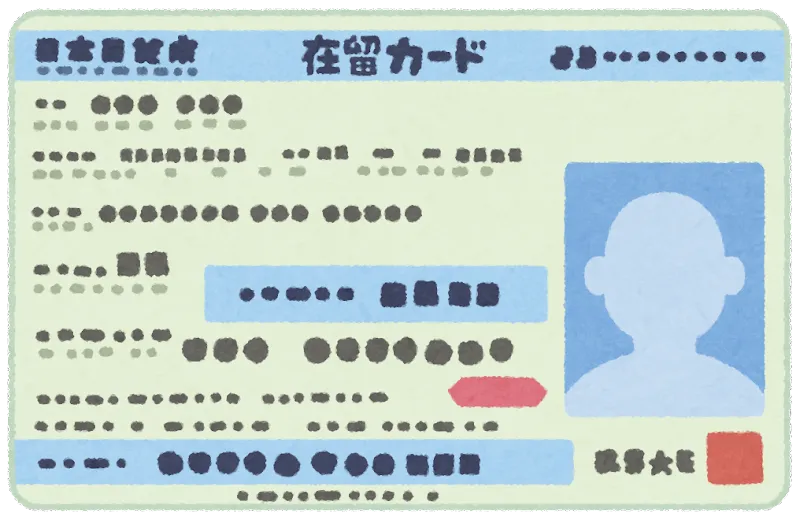
A residence card (official name: Residence Card, English name: Residence Card) is issued to foreign nationals residing in Japan for medium- to long-term stays (three months or longer). It serves as an important official identification card to prove that you are a foreigner who has been legally staying in Japan and whose status of residence has been approved.
Residence cards are mainly issued to foreign nationals with the following status of residence
- permanent resident
- long-term resident
- Spouse or Child of Japanese National
- Spouse or Child of Permanent Resident
- dependent (e.g. in a family)
- studying abroad (usu. at university level)
- technical internship
- Technical/Humanities/International Services
- intra-company transfer
- care
- Specified activities (working holidays, foreign nurse/caregiver candidates under economic partnership agreements, etc.)
On the other hand, there are some statuses of residence that are not covered by the issuance of a residence card. For example, those with "Temporary Visitor," "Diplomat," or "Official" status of residence will not be issued a residence card.
The resident card is equipped with an IC chip to prevent forgery and alteration, and all or part of the information on the card is recorded. The Residence Card was issued on July 9, 2012 to replace the Alien Registration Card.
Possession of a resident card is proof of lawful residence in Japan. Therefore, foreign nationals who are mid- to long-term residents must carry their resident card with them at all times (see below for details on the obligation to carry the card).
A residence card is used not only as proof of status of residence, but also as identification in various situations. For example, a residence card is required to open a bank account, sign a rental contract, or sign a cell phone contract.
Situations in which the Residence Card is used and what is written on the front and back of the card

Residence cards (residence cards) are used not only as proof of status of residence, but also as identification in a variety of situations. For example, you will be asked to present your residence card when opening a bank account, signing a rental contract, or signing a cell phone contract.
What does a residence card actually contain? Let's take a look at the information on both the front and back of the card.
Information on the front of the resident card
The following items are listed on the front page. In addition, if you are 16 years of age or older, your photo will be displayed.
- resident card number
- identity
- Date of Birth
- gender
- Nationality/Region
- residence (usu. residential)
- status of residence (in Japan)
- period of stay
- Permissibility of work restrictions
- effective date
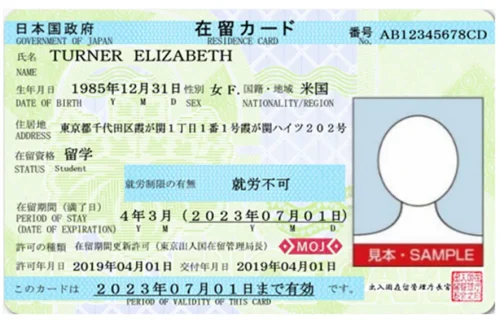
Information on the back of the resident card
On the reverse side, there are columns for "Place of Residence," "Permission to Engage in Activity other than that Permitted under the Status of Residence," and "Application for Permission to Extend Period of Stay.
・Address
The date of notification of any change in the place of residence and the new address are noted.
・Permission to Engage in Activity other than that Permitted under the Status of Residence
This is the column in which the details of the permission are written when you receive permission to engage in activities other than those permitted under the status of residence. Even if the front of the form says "Not Permitted to Work," you may work within the scope of the regulations if you have a Permit to Engage in Activities other than that Permitted by the Status of Residence.
・Application for extension of period of stay
When you have applied for permission for extension of period of stay or permission for change of status of residence, this column is used to indicate that the application is in process.
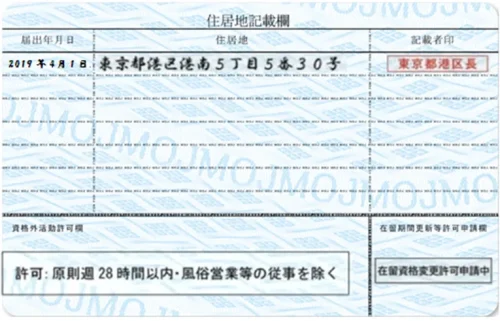
Confirmation of work availability
Of particular importance on the resident card is the information on whether or not a foreigner is allowed to work. The column on the front of the resident card entitled "Permission to work" indicates whether or not the foreigner is allowed to work in Japan.
The availability of work restrictions is categorized as follows
- No work restrictions
- I can't work.
- Only work activities specified in the designation form are allowed.
- Only employment activities based on status of residence are allowed.
- Only work activities based on the status of residence at the organization listed on the designation form are allowed.
Even if the "No Work" section of the visa says "Not Permitted to Work," you are allowed to work if the "Permission to Engage in Activities other than that Permitted under the Status of Residence" on the reverse side of the visa states that you are permitted to work within the scope of your work permit. This is mainly the case for international students, who are allowed to work part-time. By obtaining "Permission to Engage in Activity other than that Permitted under the Status of Residence", international students can work, which is not permitted in principle.
The "Only work activities designated by the letter of designation are permitted" is often found among those with working holiday status. In this case, it is important to check the letter of designation together with the resident card. This is because the letter of designation also contains precautions regarding work. Working holiday status is indicated as "Designated Activities", but it is important to note that there are some people with Designated Activities who are not on a working holiday.
The "Only work activities based on status of residence" category applies to those who have status of residence such as International Business, Research, or Specialist in Humanities. Only work within the scope permitted by the status of residence is permitted, and no other work is allowed. If you work beyond the scope of your status of residence, you will be considered to be working illegally.
Only work activities based on the status of residence at the designated organization are permitted" applies to technical intern trainees. Technical intern trainees are not allowed to work or have part-time jobs outside of the receiving institution.
New "Specified Technical Skills" Resident Status
Starting in 2019, a new status of residence, "specified skills," has been added. There are two types of Specified Technical Skills, No. 1 and No. 2, which allow foreigners with certain skills and Japanese language proficiency to work in specific fields. Specified Technical Skill No. 1 allows foreign nationals with certain skills and Japanese language ability to work in a specific field for five years after passing a technical test and a Japanese language test in the respective field or completing Technical Internship No. 2. The first category allows those who have completed the first stage of the specified technical skills to transfer to the second category, and there is no limit on the number of renewals. If a person has obtained up to the specified technical skill No. 2 and has fulfilled the 10-year period of stay, there is a possibility of obtaining permanent residence status.
Difference between specified skills and technical training
It is also important to mention the difference between specified skills and technical internship. The purpose of the technical internship system is for foreigners to learn skills in Japan that are difficult to acquire in their home countries and to put those skills to use after returning to their home countries. On the other hand, the specified technical intern trainees are expected to work as highly skilled foreign human resources. Another major difference is that while technical intern trainees are not allowed to change jobs, specified skilled workers can change jobs.
As described above, the resident card contains important information regarding the employment of foreign nationals. By carefully checking the information on the front and back of the resident card, it is possible to determine what kind of activities the foreigner can engage in in Japan.
Where can I get one? How to obtain a residence card and the process
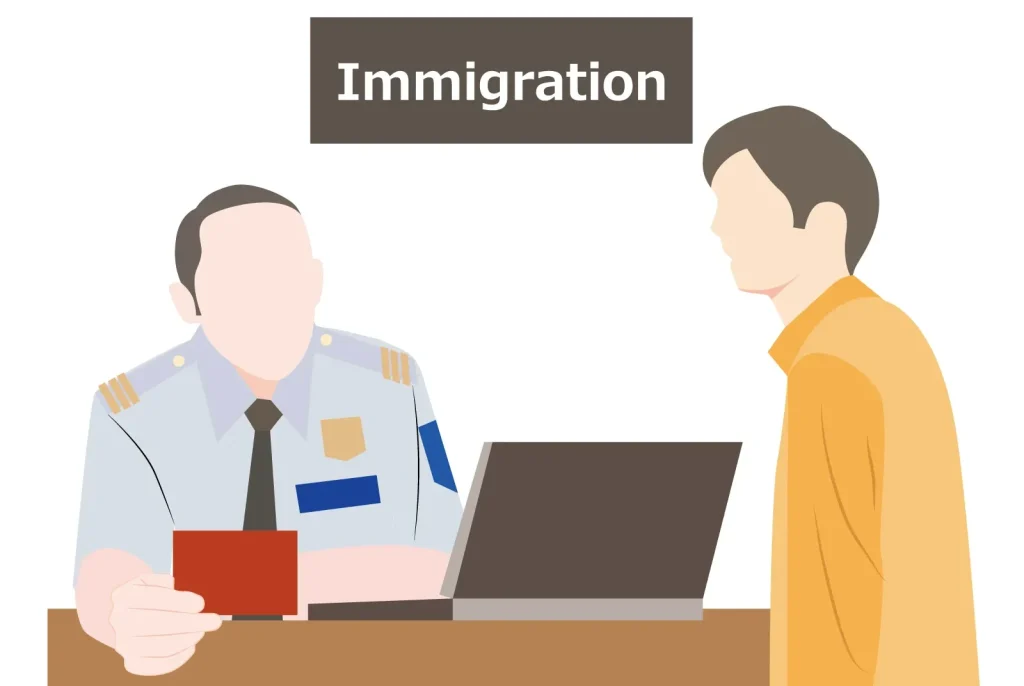
Residence cards (residence cards) are either issued at the airport when mid- to long-term residents enter Japan or at a later date.
As a prerequisite, the person or organization accepting the foreigner into Japan must apply for a "Certificate of Eligibility" in Japan. If landing in Japan is approved, a "Certificate of Eligibility" is issued, and the foreigner himself/herself applies for visa issuance at a local diplomatic mission abroad (Japanese embassy or consulate).
- The person or organization accepting the applicant in Japan must "Apply for Certificate of Eligibility".
- Accepted by the Immigration and Immigration Control Agency.
- Issuance of Certificate of Eligibility
- Sent to foreign nationals residing abroad
- Foreigners themselves bring their Certificate of Eligibility and other necessary documents to the local diplomatic mission abroad.
Application for visa issuance - Entering Japan with a passport with visa attached
A foreigner enters Japan with a passport accompanied by a visa. The timing of issuance of the residence card differs depending on the airport of entry.
Residence cards are issued at any major airport in Japan at the time of landing permission.
- Major Airports
- Narita Airport
- Haneda Airport
- Kansai International Airport
- New Chitose Airport
- Chubu Airport (central Japan)
- Hiroshima Airport
- Fukuoka Airport
At the above airport, a resident card will be issued at the screening booth for mid- to long-term residents. Printing of the resident card, confirmation of the information on the card, and information on the place of residence notification will be provided, and the card printing will be completed in about one minute.
For those entering at airports or ports other than major airports, a residence card will be issued at a later date, and a residence card will be mailed to the address reported by the foreigner after entry into Japan. Usually, it takes about 10 days from the date of entry.
For more information on how to renew your residence card, required documents, and status of residence, please refer to the following article.
▶︎ The Resident Card System in Japan - How to Renew Your Resident Card & Required Documents and Status of Residence
Obligation to carry a resident card at all times and penalties
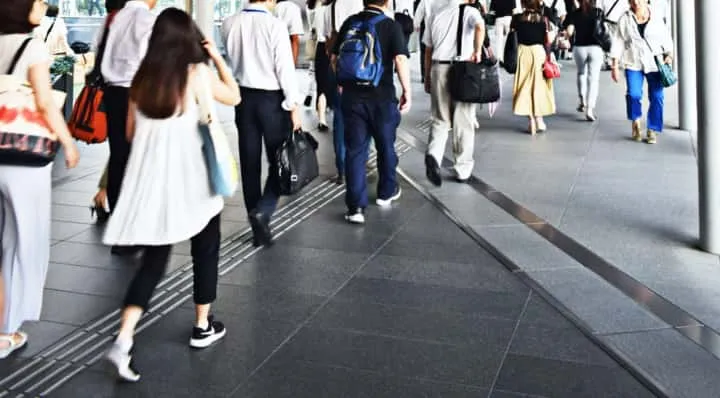
Foreign nationals residing in Japan for medium to long periods of time are obliged to carry their resident card at all times. This is a measure to prevent illegal stay in Japan, and foreigners must carry their resident card at all times.
Foreigners are obliged to present their resident card when asked to do so by a police officer or immigration inspector. Refusal to present it or failure to carry the resident card may result in penalties.
However, foreigners under 16 years of age are exempted from the obligation to carry their residence card at all times.
Violation of the obligation to carry your resident card at all times may result in a fine of up to 200,000 yen. Foreign residents are advised to carry their resident card at all times.
Foreigners are also required to carry a passport, but if they carry a residence card, they do not need to carry a passport.
A residence card is an important document that proves the status of a foreigner staying in Japan. It is important not to neglect to carry it with you at all times.
How to reissue a lost residence card and what you need

If your residence card (Residence Card) is lost or stolen, you must apply for reissuance as soon as possible. Application for reissue should be made within 14 days of the loss to the regional immigration office with jurisdiction over your place of residence.
If you lose your residence card overseas, first report the loss to the local police and obtain a "Certificate of Report of Lost Residence Card" at a Japanese diplomatic mission abroad. Then, within 14 days of re-entering Japan, apply for a re-issuance of your residence card at a regional immigration office.
The documents required to apply for reissuance of a residence card are as follows
- Application form for reissuance of resident card (available at the Immigration and Residence Office)
- Photograph (4 cm x 3 cm, taken within the last 3 months)
- passport
- In case of loss: certificate of acceptance of lost property report (issued by police station)
In case of theft: certificate of receipt of theft report (issued by the police station)
If lost in a disaster: Certificate of disaster (issued by the municipality) - Commission (1,600 yen)
In addition to the documents listed above, the following documents are also required if the applicant is under 16 years of age.
- Application for Re-issuance of Residence Card (if applicant is under 16 years old)
- Copy of residence card for those under 16 years old (if you have one)
If your application for reissue of a residence card is accepted, a new residence card will be issued at a later date.
The following article explains the detailed procedures to follow if you have lost your residence card.
▶︎ How to reissue a lost residence card! Locations, procedures, and required documents are also explained.
The resident card is indispensable for foreigners living in Japan. Please take good care of it to avoid losing it, and in the event that you do lose it, please apply for a re-issuance as soon as possible.
Serious employment support to help you realize your dream of working in Japan!

Do you want to work in Japan?
Let us "Goandup" make that dream a reality!
【 Program Features 】
✅ JLPT N3 level Japanese language acquisition
✅ Thorough preparation for the specific skills test
✅ Full support for job hunting in Japan
Business-focused one-on-one lessons will help you find a job in Japan in the shortest possible time.
【 Program Menu 】
- Individual Japanese language lessons
- Intensive curriculum to obtain N3, especially specialized lessons for business Japanese that can be used at work.
- Intensive curriculum to obtain N3, especially specialized lessons for business Japanese that can be used at work.
- Preparation for the Specific Skills Test
- Customized materials for specific skill tests will be used to focus on frequently asked questions and learning to pass the test.
- Customized materials for specific skill tests will be used to focus on frequently asked questions and learning to pass the test.
- Resume and CV support
- To create resumes and CVs tailored to Japanese corporate culture, and to brush up on self-promotion and motivation for application.
- To create resumes and CVs tailored to Japanese corporate culture, and to brush up on self-promotion and motivation for application.
- Interview Preparation
- Guidance on areas for improvement through mock interviews and feedback based on corporate interview scenarios. Learn interview etiquette and behavior unique to Japan.
- Guidance on areas for improvement through mock interviews and feedback based on corporate interview scenarios. Learn interview etiquette and behavior unique to Japan.
- career consulting
- Provide introductions to companies that match the participant's career goals, select companies to apply to, and provide advice on the level of knowledge required by the companies to which the participant is applying.
- Provide introductions to companies that match the participant's career goals, select companies to apply to, and provide advice on the level of knowledge required by the companies to which the participant is applying.
- Chat Support
- In addition to one-on-one individual lessons, we also accept casual questions via DM (visa application, living support, assistance in finding a room, etc.).
If you are serious about your career in Japan, join us now!
▶︎ for more informationclick here.
We will do our best to support your success in Japan!
summary
A residence card (Residence Card) is a very important identification card for foreign nationals residing in Japan for a medium to long period of time. The Residence Card contains important information about your stay in Japan, such as your status of residence and period of stay.
Foreign residents are reminded that they are obliged to carry their residence card at all times and should always carry their card with them. If you happen to lose your card, please apply for a reissue as soon as possible.
The resident card is also an important document for confirming whether or not you are permitted to work. It is important for foreign nationals who plan to work to carefully check the information on the front and back of their residence card to confirm that their status of residence allows them to work.
The number of foreigners residing in Japan is increasing every year and is expected to increase further in the future. In order for foreign residents to live and work in Japan with peace of mind, it is essential for them to deepen their knowledge of residence cards.
To learn more about obtaining residency status and permanent residence, check out the following articles.
・Explanation of status of residence "Technical/Humanities/International Services"!
・Japanese Permanent Residency and Naturalization Process! From difficulty and countermeasures to success points
Your support will help us!
Thank you for visiting Goandup Picks. Our mission is to provide you with more useful information to show the world what Japan has to offer.
Your support will help us to further enhance our activities, so please support us!






